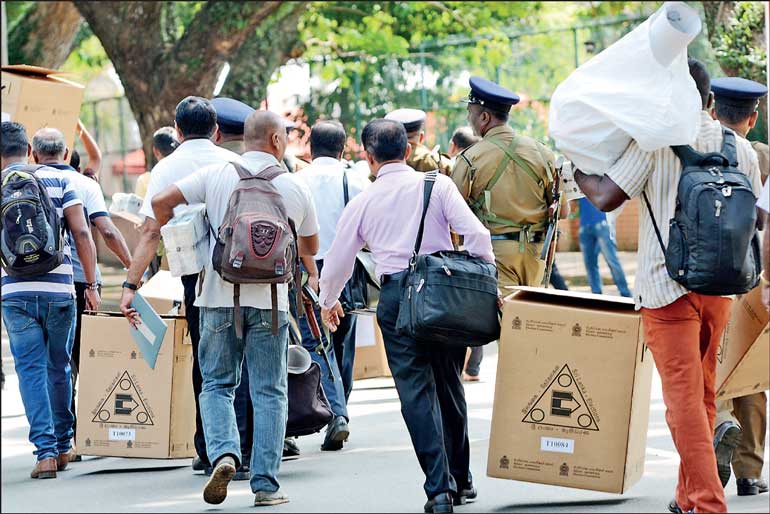Wednesday Feb 18, 2026
Wednesday Feb 18, 2026
Thursday, 22 February 2024 00:24 - - {{hitsCtrl.values.hits}}

In this crucial election year, we need to ask ourselves why it is necessary to change the existing system – Pic by Shehan Gunasekara
 Earlier this week, the President’s Media Division issued a statement to the effect that the next Presidential election will be held on schedule. What was the need for that statement? In terms of the Constitution, the President’s term of office ends not later than 18 November 2024. As far as I am aware, no Member of Parliament has given any indication that he or she intends to introduce a Bill to amend the Constitution to extend the term of office of the President, as required by article 83 of the Constitution. Such a Bill, if passed with a two-third majority, will also need to be approved by the people at a referendum. In the absence of any such move, what was the need for the President’s Media Division to assert the obvious? Was it to stifle the movement for restoring the parliamentary executive that now appears to be gathering wide public support?
Earlier this week, the President’s Media Division issued a statement to the effect that the next Presidential election will be held on schedule. What was the need for that statement? In terms of the Constitution, the President’s term of office ends not later than 18 November 2024. As far as I am aware, no Member of Parliament has given any indication that he or she intends to introduce a Bill to amend the Constitution to extend the term of office of the President, as required by article 83 of the Constitution. Such a Bill, if passed with a two-third majority, will also need to be approved by the people at a referendum. In the absence of any such move, what was the need for the President’s Media Division to assert the obvious? Was it to stifle the movement for restoring the parliamentary executive that now appears to be gathering wide public support?
The hypocrisy of politicians
The leader of the SLFP, Maithripala Sirisena, has publicly declared that he supports the abolition of the executive powers of the President. In 2019, the JVP’s Anura Kumara Dissanayake presented a Bill to enable the then non-executive President to be elected by Parliament. In 2021, SJB leader Sajith Premadasa proposed a constitutional amendment to enable a non-executive President to be elected by Parliament. None of these political leaders now show any inclination to implement their previous commitments. Instead, they have publicly announced their intention to seek election to the office of Executive President. The chief whip of the Opposition offers a hilarious half-way deal: first hold the Presidential election; then abolish the office!
Lawyer-parliamentarian Udaya Gammanpila sees the call for abolishing the executive presidency as “part of a conspiracy to postpone the next Presidential election”. He argues that since the Supreme Court has previously held that a parliamentary vote to remove the executive powers of the President should be followed by a referendum, “if a person challenges the validity of the referendum, the executive presidency will not be abolished pending the Supreme Court determination, and the incumbent President can remain in power until the dissolution of Parliament in August 2025. He explains that the hearing of a petition could take six months or even longer.
The obligation of the President
The responsibility to give effect to what is now an increasingly vocal public demand surely rests with the Head of Government, the incumbent President. In 2013, the Ranil Wickremesinghe-led UNP published the text of the principles upon which a new Constitution would be formulated after it forms a government. Among them was that the executive presidency would be abolished. In 2018, the Government of Prime Minister Ranil Wickremesinghe prepared and published a draft Constitution which required the President to be elected by Parliament and to exercise his/her powers on advice. It is surely the responsibility, if not the obligation, of President Ranil Wickremesinghe to set in motion the legal processes necessary to achieve that objective before time begins to run out.
Bill for the 22nd Amendment to the Constitution
 The first step should be to reform the electoral system. Since the list system of election to Parliament, based on proportional representation, is an integral element in the executive presidential system of governance, the Constitution will need to be amended to replace that system with the first past-the-post system of single and multi-member constituencies that prevailed under the 1946 and 1972 Constituencies. These will need to be supplemented with an element of proportional representation to ensure that minorities are adequately represented, and that there is equitable distribution of seats based on the totality of votes cast for each political party. Following the passage of this constitutional amendment by a two-third majority, the delimitation of electorates will need to commence immediately.
The first step should be to reform the electoral system. Since the list system of election to Parliament, based on proportional representation, is an integral element in the executive presidential system of governance, the Constitution will need to be amended to replace that system with the first past-the-post system of single and multi-member constituencies that prevailed under the 1946 and 1972 Constituencies. These will need to be supplemented with an element of proportional representation to ensure that minorities are adequately represented, and that there is equitable distribution of seats based on the totality of votes cast for each political party. Following the passage of this constitutional amendment by a two-third majority, the delimitation of electorates will need to commence immediately.
Bill for the 23rd Amendment to the Constitution
The next step should be another constitutional amendment for the following purposes:
A Bill for the above purposes will require to be passed with a two-thirds majority. The Constitution does not require such a Bill to be approved at a referendum. However, the Supreme Court has been inconsistent on this question. In 2015, Chief Justice Sripavan and two other Judges held that the 19th Amendment (which required the President to act on the advice of the Prime Minister) was not required to be approved at a referendum, but different benches of Judges have since, in my view erroneously, held that approval at a referendum is required. Therefore, it is advisable for the Government to state at the outset that it intends to submit the Bill to a referendum. This Bill, after being approved at a referendum, will come into force upon being certified by the President.
Dissolution of Parliament
The third and final step would be to dissolve Parliament, and fix dates for receiving nominations and for conducting the poll. The general election and the referendum could be held on the same day. If the President-in-office intends to be a candidate at the general election, he will need to resign his office upon issuing the proclamation dissolving Parliament. Since the incumbent Prime Minister may also be a candidate, the proposed Bill for the 23rd Amendment will need to make provision for the incumbent President to nominate a suitable person who is not a member of any political party to serve as interim president, and for such interim president to hold office until Parliament, after the general election, elects the President.
A new Constitution
During a brief conversation on a flight to Colombo, four months after he had been elected by Parliament to the vacant office of President, Ranil Wickremesinghe mentioned to me that one of his priorities was to solve the ethnic problem. I had no reason to disbelieve him. In fact, I accepted, and still do accept, that he had set that as a priority for himself during his tenure in the highest office in our country. Unfortunately, his belief that the full implementation of the provisions in the Constitution introduced by the 13th Amendment in 1987, during a bloody civil war, would achieve that objective is unfounded.
The strident response of the TNA spokesman Sumanthiran that nothing short of federalism will satisfy the Tamil population in the North and East, demonstrates the futility of seeking a solution based on that much maligned controversial constitutional amendment. Equally unfounded is his belief that a Truth and Reconciliation Commission (which is based on the Christian concept of Confession) will be appropriate for our country.
If President Wickremesinghe’s objective is national reconciliation and reintegration, Sri Lanka needs a new Constitution with a strong democratic foundation and based on the recognition that Sri Lanka is a multi-ethnic, multi-religious, and multi-linguistic country. The Constitution must also assert that Sri Lanka is a secular country, as Singapore does, in which everyone has the right to freedom of thought, conscience and religion, and does not need the intervention of the State to exercise that right.
It is desirable that a new Constitution should also contain the following provisions:
Conclusion
A new Constitution to replace the 21-times amended, author-unknown, and drafting-process-unknown, 1978 Constitution, is the real need of the hour. It will obviate the necessity to adopt the 22nd and 23rd Amendments referred to above. It will need a general election before it becomes fully operative, but it will not require a referendum to bring it into force. If the 1946 Constitution could have been drafted by a young assistant legal draftsman in three months, using a borrowed typewriter to work on; and if the 1972 Constitution could have been drafted in even less time, both at little or no expense to the State, there is no reason why a new Constitution for Sri Lanka cannot be drafted and adopted by Parliament before the Elections Commission begins the process of electing a new Executive President.
In this crucial election year, we need to ask ourselves why it is necessary to change the existing system. In answering that question, we must have regard not only to the manner in which this country has been governed during the past five decades, but also to the quality of governance in the world around us with which we must necessarily interact. We need to look ahead to the next 25 years and ask whether the constrictive framework of governance prescribed in the 1970s is appropriate or adequate to meet the challenges of the new millennium.
(The writer holds an LL.B (Ceylon), Ph.D (London). He is a former Permanent Secretary to the Ministry of Justice, who also served briefly as Attorney-General. He taught Comparative Constitutional Law at the University of Hong Kong, and at the University of Saskatchewan in Canada where he occupied the Ariel F. Sallows Chair of Human Rights. He is the author of The Judicial Application of Human Rights Law, (Cambridge University Press, 2002, 2nd ed.2017, 1200 pp.).)